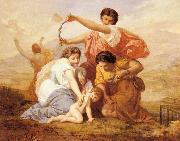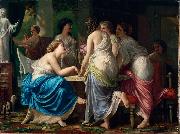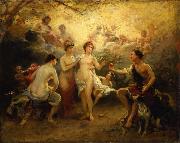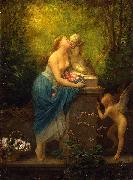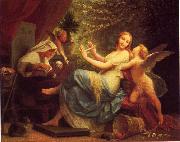Henri-Pierre Picou Olja Måleriet ReproduceringAll Henri-Pierre Picou Oil Paintings(27 February 1824 - 17 July 1895) was a French painter born in Nantes.His oeuvre began with portraits and classical historical subject matter but he later moved on to allegorical and mythological themes.He was an academic painter and one of the founders of the Neo-Grec school, along with his close friends Gustave Boulanger, Jean-L??on G??rôme, and Jean-Louis Hamon, also academic painters. All of them studied in the workshops of both Paul Delaroche and later Charles Gleyre. Picou's style was noticeably influenced by Gleyre. While the rest of the group generally painted classical and mythological subjects, Picou also received commissions for large religious frescoes from many churches, including the Église Saint-Roch. His artistic debut was at the Salon in 1847. The next year he was awarded a second-class medal for his painting, Cl??opâtre et Antoine sur le Cydnus. Also known as Cleopatra on the Cydnus, it is commonly regarded as Picou's masterpiece. This showing at the Salon in 1848 was written about by the critic Th??ophile Gautier, who felt that the subject matter was too ambitious, but also said that "As it is, it gives the best hope for the future of the young artist, and ranks among the seven or eight most important paintings of the Salon.In 1875 the painting was exhibited in New York, and afterward found lodgment on the walls of a private art gallery in San Francisco.Picou maintained a large workshop in Paris on the Boulevard de Magenta, which provided him room to work on his expansive frescoes. His popularity continued to rise and he went on to win the Second Prix de Rome in 1853 for his painting, J??sus chassant les vendeurs du Temple (The Moneylenders Chased from the Temple), and another second-class medal for his Salon painting in 1857. From his debut in 1847, he was a regular at the Salon, showing almost every year until his final exhibit in 1893.He has been called the most fashionable painter towards the close of the Second French Empire |
|||

|
|||
|
|
|||
|
||||||||
| Henri-Pierre Picou (27 February 1824 - 17 July 1895) was a French painter born in Nantes.His oeuvre began with portraits and classical historical subject matter but he later moved on to allegorical and mythological themes.He was an academic painter and one of the founders of the Neo-Grec school, along with his close friends Gustave Boulanger, Jean-L??on G??rôme, and Jean-Louis Hamon, also academic painters. All of them studied in the workshops of both Paul Delaroche and later Charles Gleyre. Picou's style was noticeably influenced by Gleyre. While the rest of the group generally painted classical and mythological subjects, Picou also received commissions for large religious frescoes from many churches, including the Église Saint-Roch. His artistic debut was at the Salon in 1847. The next year he was awarded a second-class medal for his painting, Cl??opâtre et Antoine sur le Cydnus. Also known as Cleopatra on the Cydnus, it is commonly regarded as Picou's masterpiece. This showing at the Salon in 1848 was written about by the critic Th??ophile Gautier, who felt that the subject matter was too ambitious, but also said that "As it is, it gives the best hope for the future of the young artist, and ranks among the seven or eight most important paintings of the Salon.In 1875 the painting was exhibited in New York, and afterward found lodgment on the walls of a private art gallery in San Francisco.Picou maintained a large workshop in Paris on the Boulevard de Magenta, which provided him room to work on his expansive frescoes. His popularity continued to rise and he went on to win the Second Prix de Rome in 1853 for his painting, J??sus chassant les vendeurs du Temple (The Moneylenders Chased from the Temple), and another second-class medal for his Salon painting in 1857. From his debut in 1847, he was a regular at the Salon, showing almost every year until his final exhibit in 1893.He has been called the most fashionable painter towards the close of the Second French Empire |
||||||||
|
|
||||||||
| Måleriet Identifieringen :: 72712 Clipping Cupid's Wings Oil on canvas 76.9 X 62.3 cm (30.28 X 24.53 in) cjr |
||||||||
|
|
||||||||
| Måleriet Identifieringen :: 72713 Good adventure 1872(1872) Oil on canvas 60 X 81 cm (23.62 X 31.89 in) cjr |
||||||||
|
|
||||||||
| Måleriet Identifieringen :: 72714 The Judgement of Paris Oil on canvas 21.63 X 27.5 in (54.93 X 69.85 cm) cjr |
||||||||
|
|
||||||||
| Måleriet Identifieringen :: 72716 Loss of Innocence 1885(1885) Oil on canvas 32 X 24 in (81.28 X 60.96 cm) cjr |
||||||||
|
|
||||||||
| Måleriet Identifieringen :: 72717 Innocence Seduced by Love 1886(1886) Oil on canvas 25.5 X 32 in (64.77 X 81.28 cm) cjr |
||||||||
|
|
||||||||
| FÖREGÅENDE KONSTNÄR Nästa Konstnär | ||||||||
|
|
||||||||
|
Henri-Pierre Picou (27 February 1824 - 17 July 1895) was a French painter born in Nantes.His oeuvre began with portraits and classical historical subject matter but he later moved on to allegorical and mythological themes.He was an academic painter and one of the founders of the Neo-Grec school, along with his close friends Gustave Boulanger, Jean-L??on G??rôme, and Jean-Louis Hamon, also academic painters. All of them studied in the workshops of both Paul Delaroche and later Charles Gleyre. Picou's style was noticeably influenced by Gleyre. While the rest of the group generally painted classical and mythological subjects, Picou also received commissions for large religious frescoes from many churches, including the Église Saint-Roch. His artistic debut was at the Salon in 1847. The next year he was awarded a second-class medal for his painting, Cl??opâtre et Antoine sur le Cydnus. Also known as Cleopatra on the Cydnus, it is commonly regarded as Picou's masterpiece. This showing at the Salon in 1848 was written about by the critic Th??ophile Gautier, who felt that the subject matter was too ambitious, but also said that "As it is, it gives the best hope for the future of the young artist, and ranks among the seven or eight most important paintings of the Salon.In 1875 the painting was exhibited in New York, and afterward found lodgment on the walls of a private art gallery in San Francisco.Picou maintained a large workshop in Paris on the Boulevard de Magenta, which provided him room to work on his expansive frescoes. His popularity continued to rise and he went on to win the Second Prix de Rome in 1853 for his painting, J??sus chassant les vendeurs du Temple (The Moneylenders Chased from the Temple), and another second-class medal for his Salon painting in 1857. From his debut in 1847, he was a regular at the Salon, showing almost every year until his final exhibit in 1893.He has been called the most fashionable painter towards the close of the Second French Empire |
||||||||
|
|
||||||||
|
KOMMA I KONTAKT MED Oss |





